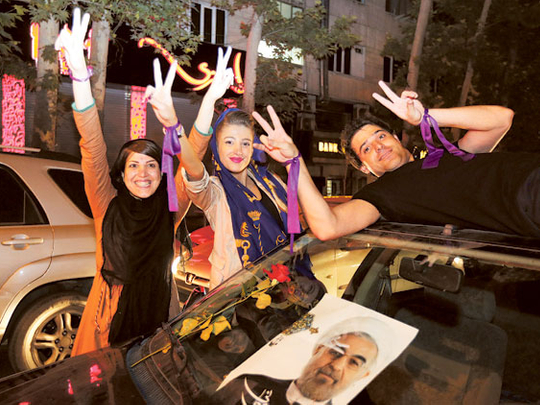
Abu Dhabi: The election of Hassan Rouhani as Iran’s new president — a moderate cleric favouring openness and improved relations with the west — sparked cautious optimism in the UAE with some analysts saying it may lead to a new chapter in relations with Tehran.
“Any president other than controversial [Mahmoud] Ahmadinejad [Iran’s outgoing president] brings hope for better relations with Tehran, although it is Iran’s Supreme Leader and not the president who controls foreign policy,” said Dr Mohammad Bin Huwaidin, professor of international relations and political science at the UAE University.
“Unlike the controversial President Ahmadinejad, Rouhani is moderate, and although he is still conservative he will bring many changes. His victory will make Iran’s Supreme Leader accept this new reformist spirit. Should the Supreme Leader [have] wanted a hardliner, nothing would have stopped him,” Dr Bin Huwaidin said.
Dr Bin Huwaidin told Gulf News the UAE and other GCC countries should throw their weight behind the reformist-backed moderate Iranian President.
“Should we stretch out a helping hand to Rouhani, it will send positive messages that GCC countries welcome Iran as a part of us, that we support building confidence and that we are ready for extensive cooperation,” Dr Bin Huwaidin said.
He praised the “good gesture” of President His Highness Shaikh Khalifa Bin Zayed Al Nahyan’s congratulatory cable to Rouhani on winning the election in which the President expressed a keenness on maintaining relations with Iran that are based on cooperation.
The 65-year-old Rouhani is a former chief nuclear negotiator who has served as secretary of Iran’s supreme national security council for 16 years.
In debates on national television and through his campaign speeches, Rouhani has come across as strongly critical of Iran’s current trajectory at home and abroad. He has expressed support for freedom of the press and said he would work to find a way out of the stalemate over Iran’s nuclear dossier, which has prompted western powers to punish Tehran with unprecedented sanctions.
Dr Abdul Khaleq Abdullah, professor of political science at UAE University, agreed that Rouhani’s victory in the presidential election meant that the Iranian people opposed the policies of the Supreme Leader and that his popularity was waning. This voting was on the Supreme Leader more than the President,” he said.
Admitting that Iran’s foreign policy may not change with the president, Dr Abdullah said electing Rouhani brings relief to the GCC countries and “we have to react positively. We should be the first to congratulate him and the first to invite him to visit Abu Dhabi and other Gulf capitals. We should welcome opening a new chapter with Iran.”
Dr Abdullah stressed that Rouhani’s endorsement had revived hopes among reformers seeking to return to the forefront of Iranian politics after the domination of hardliners during Ahmadinejad’s eight-year presidency.
However, Dr Ebtisam Al Katbi, professor of political science at the UAE University, disagreed, saying Rouhani will bring no change to Iran’s foreign policy. “According to Iran’s constitution, the president has no say on foreign policy, it is the Supreme Leader who has the greatest influence. He [the Supreme Leader] now makes decisions on foreign policy issues including the nuclear issue and Iran’s role in the region, particularly in Syrian, Lebanon and Iraq,” Dr Al Katbi said.
Iran’s Supreme leader, Dr Al Katbi said, has not only reduced the president’s powers on foreign policy issues, but based on the selection of presidential contenders by the Guardian Council, he is fully determined that the next president will just execute his orders on all issues.
Dr Al Katbi cited unsuccessful attempts to challenge the Supreme leader’s authority by former presidents Mohammad Khatami, seen as the leader of Iran’s reformist movement and Ahmadinejad.
Dr Al Katbi does not see Rouhani bringing any breakthrough in Iran-occupied Abu Mousa near the mouth of the strategic Strait of Hormuz, along with Greater and Lesser Tunbs.
Iran occupied the three islands on the eve of the UAE’s independence in December 1971 and the issue has been a point of contention between the two countries ever since.
“There could be no compromise whatsoever on the issue of occupied islands because it is the sacred cow of both reformists and hardliners,” Dr Al Katbi said, citing a visit that the Revolutionary Guards paid to the three islands during Rafsanjani’s reign.
UAE leaders, including Shaikh Zayed, the nation’s founder, have repeatedly urged successive Iranian governments to end the dispute through direct negotiations or international arbitration. These calls, however, have been consistently turned down by Iranian officials.
Warning that Rouhani is just a moderate figure to negotiate on ways to transform Iran’s damaged relations with the west, Dr Al Katbi advised that leaders of the Gulf should not be the first to offer concessions. “They should wait and see what will Rouhani do and act accordingly.”












